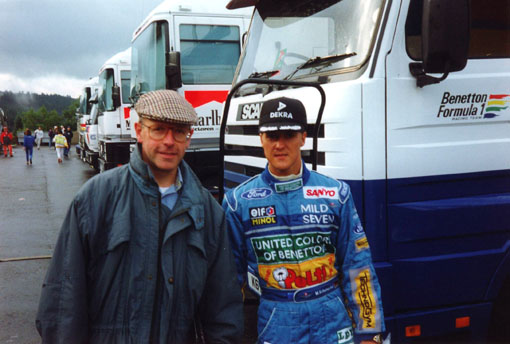

1994 BELGIAN GRAND PRIX
SPA-FRANCORCHAMPS
Michael Schumacher, posing with Carlos Ghys.

Even before Ayrton Senna's death in the San Marino GP at Imola in 1994, Michael Schumacher had started to lay his claim to the Brazilian's mantle as the world's best driver.
Having risen through the ranks of karting, Formula Ford and Formula Three in Germany, the 'wunderkind' first showed his real mettle as part of Sauber-Mercedes' Junior Team in the World Sportscar Championship. But it was when he made his F1 debut at Spa in 1991, standing in for jailed Bertrand Gachot at Jordan, that the F1 world sat up and took notice. Within a race, Benetton had stepped in and snaffled him from underneath Eddie Jordan's quivering nose.
His blend of raw speed, shrewd racecraft, superb wet-weather skills and supreme tactical acuity marked him out from the start as the man most likely to challenge Senna. And like the Brazilian, Schumacher exhibited a willingness to commit the on-track professional foul if it was necessary. In his first full season in 1992 he rallied Benetton behind him, and thus began the legend of a man who demanded the complete attention of his team, at the expense of his teammates.
That season he won his first Grand Prix, at Spa, and in 1993 he won more. But it was that tragic 1994 season which saw him rise to the top. He won the opening two races, and was chasing Senna at Imola when the Brazilian crashed fatally. But thereafter, though Schumacher became the new yardstick, controversy was never far away. Benetton was accused of cheating that year, and after a three-race ban for ignoring a black flag, he finally won his first title only after pushing Damon Hill off the road.
Armed with the same Renault engine as Hill in 1995, he made a much cleaner job of his second title, but then dismayed Benetton by switching to Ferrari for 1996. A third title eluded him that season, but after a poor start to 1997 he clawed back Jacques Villeneuve's advantage until they went into the final race in Jerez with the German a point ahead. Since 1994 Schumacher had done much to rehabilitate his image, but he sullied it again by trying to take Villeneuve off the road after the French-Canadian had caught him out with a surprise overtaking move. This time Schumacher lost out, and Villeneuve clinched the title.
Since then Ferrari has struggled against McLaren, but Schumacher ran Hakkinen close for the 1998 championship and was challenging again in 1999 when he crashed on the opening lap of the British GP at Silverstone and broke a leg. Sidelined for much of the season, he even considered retirement, but came back stronger than ever in Malaysia. There he gifted victory to teammate Eddie Irvine, to help him in his championship fight with Hakkinen, but in Suzuka observers questioned his commitment as he trailed the Finn home.
Schumacher soon put pay to those critics by wining the 2000 World Championship, Ferrari's first since Jody Scheckter in 1979.
The following year, in Hungary, he equalized Alain Prost's record of 51 GP victories and gained his fourth World Championship title. He was completely dominant in the 2002 World Championship and thus equalled Juan Manuel FangioÍs record of five World titles and went on to win titles in 2003 and 2004.